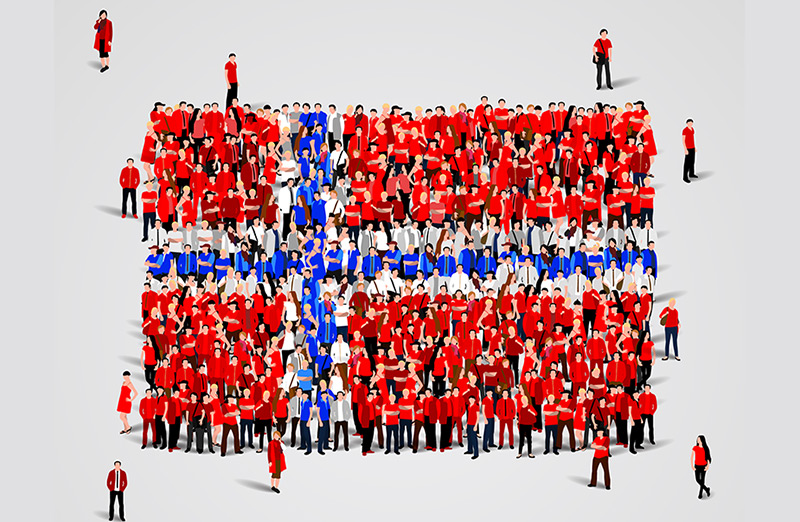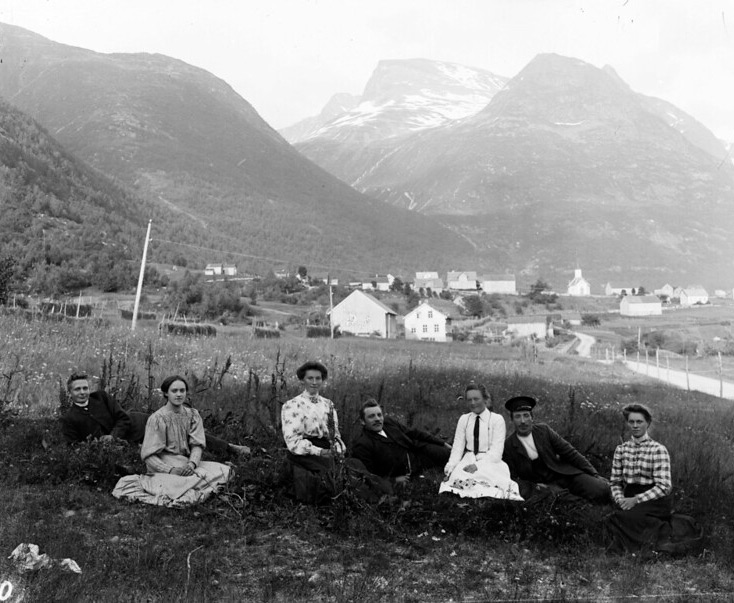Many of our readers have longed to move to Norway for years. But sometimes, reality is quite different from the dream. We take a look at some of the worst reasons to make the move.
People move to Norway for a variety of reasons. For some, it’s for love or a job, for others, it’s to find better opportunities or flee a conflict.

But there are bad reasons to move to the land of the Vikings. Many people have misconceptions about Norway and may end up feeling underwhelmed after moving here.
Get the straight facts and avoid the pitfalls by reading our factual but not-too-serious list of reasons not to move to Norway.
“Norway is the happiest country”
Norway is often considered to be one of the happiest countries in the world, if not the happiest. Well it turns out that it's not anymore, and hasn’t been for a while.
But let’s not be unfair. Norway still topped the ranking quite a few times, and seems to have consistently earned a spot in the top 10 in most rankings.
To be happy in Norway, you have to approach the concept of happiness like a Scandinavian. You have seasonal affective disorder in Philadelphia or Leeds? Try making things a bit more koselig.

You want self-realisation through a job that links your skills with your passions, with money to boot? While they also like money, Scandinavians highly value work-life balance.
In short, finding happiness in the Scandinavian way is about making the best of your situation with little moments of bliss here and there, instead of pursuing the never-quite-attainable goal of “happiness”.
“Norway is a socialist country”
Norway sometimes gets painted as a socialist (or even communist) country. It is, in fact, capitalist, with free trade having a high priority and a set of property rights that are much more in line with capitalism than with communism.
Some economists have referred to the Nordic economic model as a form of cuddly capitalism.

It has low levels of inequality, generous welfare states, and reduced concentration of top incomes, contrasting it with the more “cut-throat capitalism” of the United States, which has high levels of inequality and a larger concentration of top incomes.
In short, you may want to come to Norway because of the country’s public health care system or social safety net, and that’s fine. But the “socialist” label just does not apply.
“It’s the country of my ancestors”
Your great-grandparents may have come from Norway on a steam ship in the late 19th or early 20th century, but the truth is she would barely recognise the country she left if she came back.
In 1900, Norway was still largely a farming and fishing nation. The country’s major cities weren’t even linked by rail yet. Staple dishes of today such as Grandiosa pizza and Norwegian taco did not yet exist!
Since then, Norway discovered oil, exploited that resource for many decades, becoming very rich in the process, and even started making plans for what would come after the oil.

Today’s Norway is a very different country than the one left behind by boatloads of emigrants. The stories they passed down are now just a distant memory.
“Salaries are high”
While it’s true that salaries in Norway are typically higher on the low end, things tend to equalise a bit more once you climb up the scale a bit.
Add to that the fact that the Norwegian krone has gone down in value in the last decade, and salaries in Norway are not as impressive as they used to be.
What is remarkable about Norway is the lower levels of inequality. The income gap between the top 20% and the bottom 20% is smaller in Norway than in the United States, and The Global Gender Gap Index 2021 places Norway (in 3rd place) far ahead of the US (in 30th place).
Even more important than all that is the fact that finding a job in Norway is hard.
Unless you have particularly sought-after qualifications or a good network of local connections, chances are you will struggle for a few months – maybe even a few years – before you get a position you are satisfied with.

“I love black metal”
While black metal undeniably put Norway on the map for many people, most Norwegians are only vaguely aware of that fact. Black metal bands will attract a loyal following of concertgoers, but they certainly won’t get much airtime on the radio.
Black metal remains a niche segment of the heavy metal scene, which itself is dwarfed by other more mainstream genres such as pop, rock, hip hop or even country.
If it’s packed concert venues you’re looking for, you may find larger black metal scenes in other countries – that have larger cities.
“I love Lutefisk”
It may come as a shock if you come from one of North America’s Norwegian-heavy areas, but lutefisk really isn’t that big a deal in Norway. Sure, it appears on supermarket shelves and restaurant menus during the holiday season, but it’s really not that popular.
When it comes to Christmas dinners, a recent survey found that ribbe (roast pork belly with crackling) and pinnekjøtt (dried mutton ribs, steamed for several hours) are the clear leaders, being eaten by a total of 85% of survey participants at Christmas.
In contrast, lutefisk is found on only 3% of Christmas tables. And let’s face it: given its odd smell and jelly-like texture, is that really surprising?
A Norwegian once told me that even lutefisk lovers eat it for the trimmings (it is famously served with bacon but also sometimes with other sides like brown cheese or mustard). Mmmhhhh… lutefisk with brown cheese and mustard. Now that’s an idea for a new horror franchise.
“I love beer”
Norwegian beer certainly is delicious, and craft beers have exploded in numbers and in popularity over the last two decades. That being said, drinking beer in Norway has a few drawbacks.

First, there’s the obvious question of the price. A single half-litre of beer (about a pint) will set you back 25 NOK at least if you buy it at a supermarket (that’s about 2.85 USD).
In a bar, beers tend to cost around 90 NOK (10 USD) for a half-litre and premium brands can easily reach 150 NOK. That’s enough to make you reconsider that round you were going to order isn’t it?
Another less shocking but ever present fact about beer in Norway is how heavily regulated alcohol is. You can get it in supermarkets but only before 8 PM (6 PM on weekends, and forget about Sunday).
Regulations state that beers above 4.7% ABV are only available from licensed premises (bars, restaurants and clubs) or from the Vinmonopolet, a state-run alcohol retail store. As a result, your favourite beer bought from the supermarket might not exist in its original version, but in a slightly weaker (dare I say watered-down?) version.
Tell us what you think
What’s the best reason you can think of for wanting to move to Norway? Can you think of others that we haven’t mentioned? What would it take for you to make the jump and move to another country? Let us know in the comments!


If you want to drink beer, then go to Belgium. They probably have the best beer in the world.
I disagree. Belgian beer is brewed far too strong and has all kinds of odd flavours added just for the heck of it. British craft beer is by far superior. It doesn’t get the publicity but try it and you’ll soon see!
Alcohol is not my choice of drink so cost of beer is not a problem. My favorite seasons are fall, winter and spring (live in Wisconsin) so climate is good. As a licensed Clinical Social Worker, finding work may have been difficult. As a retired person I could only move if my whole family moved with us which is not likely. When my Norwegian relatives left Ringebu they brought whole extended families with them. When we visited Ringebu, I do not know how they could leave such a beautiful country.
Kay, that beautiful country at the époque had no recourses for a simply living. People massively escape from poverty, famine and disgrace, not because the country is ugly.
Amusing piece. I hope no one would move to Norway solely for the love of lutefisk or black metal. 😉
I second time that. 7 reasons not to move to Norway has still not convinced me the contrary. I love black metal. And very clement summers would relieve me of suffering intense humid hot summers that we Canadians are cursed with. I’m from Montréal by the way. And the inequality gap, have you considered that factor?
How about loving the Black Metal band called Lutefisk?
Great article, proving that reverse psychology really works. Now I want to move to Norway more than every!
I have always felt misplaced. After many visits in Norway your 7 reasons why not move to Norway are 7 reasons for me to move to Norway.
My son does his work online so he can do it anywhere that internet is available. He’s dating someone from Norway and they are talking about living together there. I’m quickly approaching retirement age soon I could draw social security and my retirement if I wanted to retire and come with them. I’d love to do that but I’m not ready to retire yet & I’m unsure I’d be able to work at my age. They’ve both asked me to consider moving to Norway with them, honestly there’s nothing to keep me in the US and I think I’d enjoy Norway from what I’ve seen and read so far. I would like to visit first as you suggested but I’m unsure if I would be able to get a Visa being so close to my Golden years. Does a satisfactory retirement package qualify as income for someone of my age group? As mentioned I’m really not ready to retire and am an accountant by trade but I’ve always wanted to write and my son wants to foot the bill for both of us for the most part. (I just can’t see myself not working at all!) Are entrepreneurial endeavors acceptable for immigrants in Norway? I have so many questions. I know I need to start language classes right away if there’s any chance I’ll be accepted. My son is all the family I have and it tears at my heart to think we won’t be able to spend at least some of our time together sharing meals, new adventures and perhaps growing our little family a bit. I love his partner as much as if he were my own son as well. That’s another thing I wondered about, are the people in Norway accepting of less conventional relationships? I’m so tired of the close-minded mentality of some that are stuck in a loop of “one man and one woman is the only way!”
yes, you can relocate as self employed, the minimum salary last I checked was 26k which seems low.
Simee, I think you are so lucky that your son is so close to you that he wants you to live with him and his partner! I would move in a heartbeat! Especially to such a beautiful country as Norway. All the details can be worked out. Main thing is that you’re with your family.
P.S. Have you moved there yet?
Kay, my mother said the very same thing when we visited. But you know they had to eat! I suppose one was fortunate to be employed as a fisherman or a domestic.
I’m an accomplished jazz musician with a bachelor’s degree in jazz performance and a master’s degree in ethnomusicology. I also did two semesters of graduate study at Oslo University. Is there a place for me in Norway?
Good article, I have been living here 12 years and can identify with much of what you have written. The one thing I certainly do not agree with is that “norwegian beer is delicious”.
Norwegian beer is sharp tasting with almost no head. Its really terrible.
I have visited Norway many times, but the main thing I would move there for is the Friluftsliv – it’s the best set up country in the world for outdoor activities. Tied into that are the reliable transport links around the country, and good mobile phone and internet coverage most places I have been so far – including in the mountains.
Points against:
i. The choice of food in supermarkets is pretty limited, though with immigration from Africa and the Middle East, we are starting to see immigrant -run groceries selling healthier foodstuffs. Swedish supermarkets are better in that respect.
ii. The immense Sovereign Wealth Fund isn’t doing the country that much good: it’s becoming full of foreign guest workers doing the jobs Norwegians used to do: even things like building stone footpaths (Nepalese built) and cabins in the mountains (Latvians for one example – Aftenposten investigated one company regarding underpayment of their workers last year). There’s no manufacturing industry either, and the country seems to be losing its classless appearance, becoming the usual western two tier society: those doing sh1t jobs/those doing some sort of computer based office work – but at least they have a living, rather than a minimum wage there.
iii. The hypocrisy regarding the natural environment: despite professing their love of nature, Norway is quite an environmentally degraded country once one gets one’s eye in and sees the signs – Norwegians hunt and fish anything that runs or swims to near- or full extinction, and plough roads and build cabins all over the place. 90% of Norwegian lakes and watercourses have some form of hydro-power scheme inflicted upon them. Lovely national anthem, tho.’
iv. The continuing treatment of Sami people as second-class citizens: see the recent protest in Merch 2023 against the Fosen Wind Farm in Trøndelag at the energy ministry in Oslo for an update (Greta pitched up at that one for a couple of days).
iv. Norwegian is an easy language to learn for us speakers of Germanic based languages, but although easy to read, and with a simple grammar which makes it staightforward to write, it is one which takes a while to understand when spoken to you. By the time I get my ear in on a visit, it’s time to come home again. The Swedes speak more clearly, nearer the way Germans speak their language: It’s the Norwegians who sound like the Swedish Chef (the real Swedish chef at Grövelsjön Fjällstation was a pretty good cook tho,’ unlike his felty counterpart).
If you can speak Norwegian, you can pretty much speak it in Denmark or Sweden without altering much, apart from a few words.
So, some pretty major faults there, but no worse or much different to anywhere else these days: people are alright wherever one goes in the world; we just don’t always get it together as nations for the good of all.
I have visited Norway many times, but the main thing I would move there for is the Friluftsliv – it’s the best set up country in the world for outdoor activities. Tied into that are the reliable transport links around the country, and good mobile phone and internet coverage most places I have been so far – including in the mountains.
Points against:
i. The choice of food in supermarkets is pretty limited, though with immigration from Africa and the Middle East, we are starting to see immigrant -run groceries selling healthier foodstuffs. Swedish supermarkets are better in that respect.
ii. The immense Sovereign Wealth Fund isn’t doing the country that much good: it’s becoming full of foreign guest workers doing the jobs Norwegians used to do: even things like building stone footpaths (Nepalese built) and cabins in the mountains (Latvians for one example – Aftenposten investigated one company regarding underpayment of their workers last year). There’s no manufacturing industry either, and the country seems to be losing its classless appearance, becoming the usual western two tier society: those doing sh1t jobs/those doing some sort of computer based office work – but at least they have a living, rather than a minimum wage there.
iii. The hypocrisy regarding the natural environment: despite professing their love of nature, Norway is quite an environmentally degraded country once one gets one’s eye in and sees the signs – Norwegians hunt and fish anything that runs or swims to near- or full extinction, and plough roads and build cabins all over the place. 90% of Norwegian lakes and watercourses have some form of hydro-power scheme inflicted upon them. Lovely national anthem, tho.’
iv. The continuing treatment of Sami people as second-class citizens: see the recent protest in Merch 2023 against the Fosen Wind Farm in Trøndelag at the energy ministry in Oslo for an update (Greta pitched up at that one for a couple of days).
v. Norwegian is an easy language to learn for us speakers of Germanic based languages, but although easy to read, and with a simple grammar which makes it staightforward to write, it is one which takes a while to understand when spoken to you. By the time I get my ear in on a visit, it’s time to come home again. The Swedes speak more clearly, nearer the way Germans speak their language: It’s the Norwegians who sound like the Swedish Chef (the real Swedish chef at Grövelsjön Fjällstation was a pretty good cook tho,’ unlike his felty counterpart).
vi. Historical persecution of the indigenous Troll population, as depicted I’m the 2011 documentary ‘Trolljakten.’ In last year’s feature film ‘Troll,’ one character blames the Christianisation of Norway during the later Viking era. It’s more likely to be the fault of humans depriving other species of their habitat than what religion they are practising at the time.
If you can speak Norwegian, you can pretty much speak it in Denmark or Sweden without altering much, apart from a few words.
So, some pretty major faults there, but no worse or much different to anywhere else these days: people are alright wherever one goes in the world; we just don’t always get it together as nations for the good of all.
Yeah, you are right about moving to Norway, Danmark is a better choice 😃🇩🇰
I have met some wonderful people from Norway and it seems like a good place to retire. However, I have also met several 2nd generation immigrant Norwegians with ancestry from eg Poland or India who have serious attitude problems, lack humility and generally have been abusive to those they consider ‘foreign’. Maybe I was unfortunate to meet those exceptions or maybe this is a trend that’s likely to worsen? Either way, I won’t be going back there through choice!